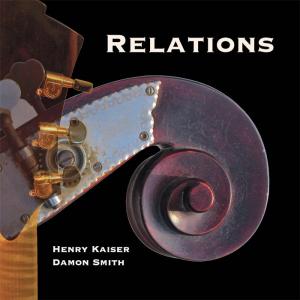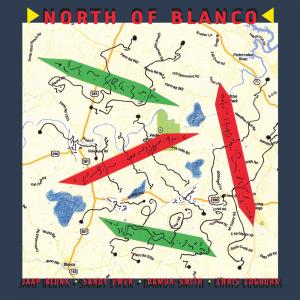
"Celestial Squid / Relations"
Musicians: Henry Kaiser / Damon Smith
Reviewed by Clifford Allen, NYC Jazz Record
It says something about the state of what we call “jazz” and improvised/creative music that a guitarist such as Henry Kaiser can be included, rightly, along figures like Grant Green, John Abercrombie and Sonny Sharrock. After all, there are just about as many ways to improvise on an electric guitar, within or without the ‘tradition’, as there are to skin a cat or juice a steak. Based in the Bay Area, Kaiser was one of the first American musicians to encourage collaboration with European free improvisers and co-founded the Metalanguage label. But he is just as likely to point out the influence of Jerry Garcia and Bob Weir as Derek Bailey and Masayuki Takayanagi and his sphere of experience also includes scoring films and working as a deep-sea oceanographic diver. Kaiser has appeared on hundreds of recordings, from fractured open improvisations to large-group projects reimagining Miles Davis’ electric work or the late songs of Albert Ayler and Mary Maria Parks, as well as a slew of solo guitar discs. The Celestial Squid is the first meeting on record between Kaiser and English guitarist Ray Russell, a heavyweight whose trajectory moved from quixotic postbop in the ‘60s through free improvisation and a blistering take on jazz-rock in the ‘70s before taking a turn into the realms of sound library and soundtrack composition. This is the first Russell disc in quite some time to feature ‘open music’ as many would think of it, though it’s fair to argue that all of Russell’s music post- 1975 has necessarily stemmed from the world of free jazz. The ensemble is a double quintet: the two guitarists and a rhythm section consisting of drummers Weasel Walter and William Winant and bassists Damon Smith and Michael Manring and saxophonists Steve Adams, Aram Shelton, Phillip Greenlief and Josh Allen. Adams’ “Gukten Limpo” starts the set with a meaty, math-rock juggernaut, off of which glint jagged, tinny blues chugging and a horn chorale that quickly becomes knotty and ricocheting. Russell is first out of the gate with thick, redoubled lines, which, while economical, gradually increase in toothy, blistering intensity. Shelton’s alto is bright and choppy against a whirlwind of flaring cymbals and intertwined, electrified strings. Even as things unspool a little, the tune’s pounding, somewhat clunky center retains its glory. “The Enumeration (for Glenn Spearman)” begins with Kaiser’s acoustic guitar falling somewhere between Derek Bailey and William Ackerman in a gentle, dusky tone poem. Reeds, electric guitar and rhythm enter in shimmering, fleshy peals, hoarse tenor and baritone shouts emerging from gauzy ether as players pay their respects in soli and rugged, fuzzed- out dialogue. Coursing through the entirety of The Celestial Squid are the parallel lingoes of Kaiser and Russell, the former an applied encyclopedia of the guitar who nudges and defers to the salty constant inventions of a slightly older Englishman.
It should be no surprise that Kaiser and Damon Smith have a lengthy history—after all, the bassist was a stalwart figure on the Bay Area free music scene until relocating to Houston in 2010. Both are historians and practitioners who have mined the landscapes of obscure artists in the realms of European, Japanese and American creative music for inspiration and to encourage community. Relations is the second volume
of duets between the two players, following 2011’s Fan the Hammer (also on Balance Point Acoustics, Smith’s label). Kaiser sticks to the acoustic guitar (seven-string) on these eight improvisations, but the combined tonal resources of the two players are enough to scuttle any notion that Relations will be a standard set of guitar- bass duos. Between the subtonal, warped masses that Smith goads out of his 1934 upright, he slowly scrapes across the lower reaches of the instrument to create a split-tone platform for Kaiser’s resonant flecks, horizontal string-scrapes and bowing—the latter somewhere between a broken harmonica and a Bennink-ified Chinese violin. But the interplay’s the thing and, whether hacking out a series of apposite actions or interweaving romanticism, Kaiser and Smith build on a fascinating series of Relations.


